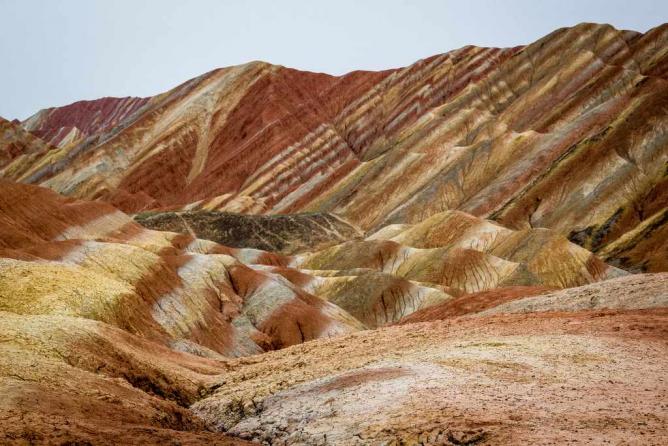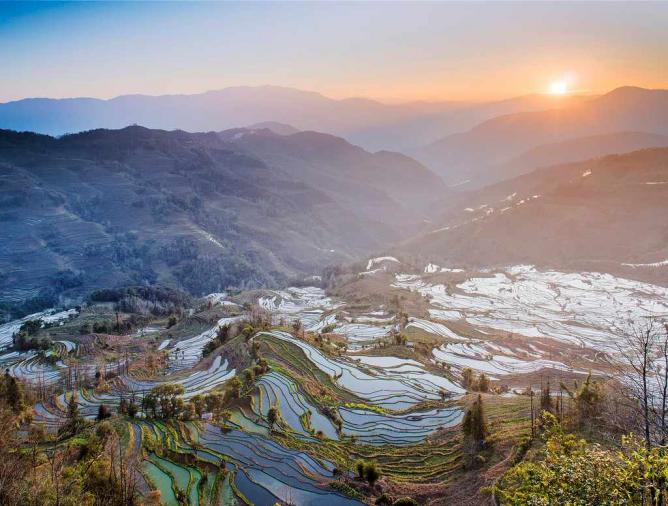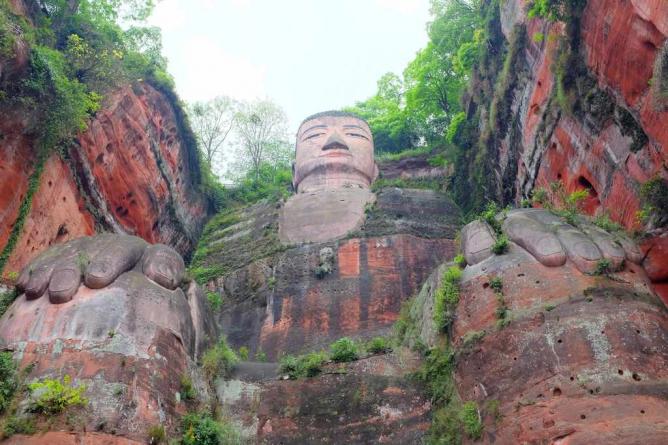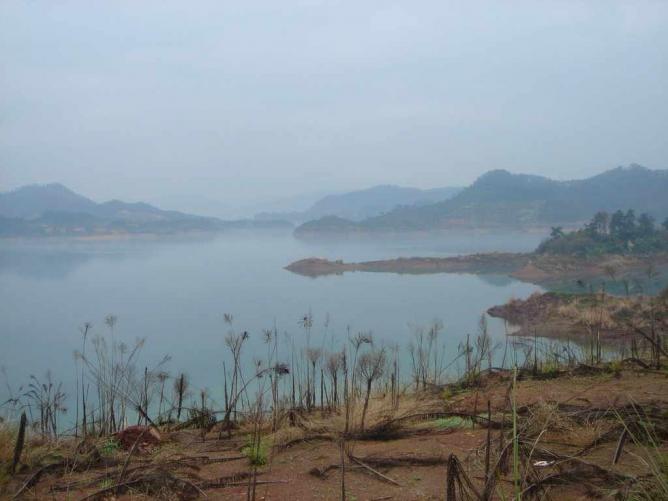Wed, Oct 8, 2025
Have a Nice Day
🕗: 6 minutes
One of the world’s largest and oldest civilizations, it’s no surprise that China is filled with countless lesser-known gems and hidden attractions waiting to be discovered. This diverse country’s astounding man-made attractions are rivaled by its remarkable natural wonders. From singing sand dunes to some of the tallest statues on the planet, here are some of the most beautiful places in China that you need to see.
Jiuzhaigou
Jiuzhaigou’s enormous lake is filled with water that changes color throughout the day and year. The color is caused by a combination of algae and calcified rocks found at the bottom of the lake, as well as the reflection of the surrounding landscape. Autumn is the best time of year to visit the lake, when it takes on a rainbow of different hues.
Jiuzhaigou, Sichuan, China
Jiuzhaigou, Sichuan, China

Zhangye Danxia Landform
Nicknamed the ‘painted mountains’ of Danxia, this incredible landscape is listed as a UNESCO World Heritage site. In this section of the Gobi Desert, the folding of layered oceanic crust created exposed rock layers of different colors and textures. Their unusual shapes, which resemble strange cones and towers, evolved over centuries of exposure to wind and rain and the colorful sedimentation layers add unique striped patterns.
Guanyin Statue
This massive statue dedicated to Guanyin, the Chinese Buddhist goddess of mercy, is part of the Nanshan Temple Complex. At 354 feet, the statue towers over the surrounding area. It’s said to be the world’s tallest statue of Guanyin, as well as the fourth tallest statue on the planet. The statue has three faces, one of which looks towards the land, and the other two which point towards the South China Sea.
Dongchuan Red Land
The Dongchuan Red Land is a 77,000-square mile area located about 25 miles southwest of Kunming City. The region’s subtropical climate causes iron to oxidize and deposit in the soil, which gives it a deep red color. The red soil color is emphasized by the other colors of the surrounding landscape, contrasting against green barley, golden buckwheat, white oil flowers, and the blue sky. Often described as a ‘palette’ of colors, the area is best visited from either May to June or September to November, when various crops are ripe and the colors are most distinct.
Saint Sophia Cathedral
With its deep green onion domes and golden crosses, Saint Sophia Cathedral is one of Harbin’s most recognizable landmarks. Standing 177 feet tall, the church is the largest Orthodox church in East and Southeast Asia. It was built by Russian expats in 1907, managing to survive the Cultural Revolution that saw most of the city’s other Orthodox churches destroyed. Today, the church’s un-restored interior houses a museum dedicated to the city, while its front square is a popular local gathering spot.
Saint Sophia Cathedral, Heilongjiang, China
Saint Sophia Cathedral, Heilongjiang, China

Yuanyang Rice Terraces
The Yuanyang Rice Terraces have been dug into the rolling landscape of the southern Ailao Mountains by the Hani people over many centuries. Covering more than 12,500 hectares, these shallow-sloped terraces reach height of up to 6500 feet above sea level. Depending on the season, the terraces are richly green or filled with water which reflects the colors and cloud shapes of the sky. Adding to the beauty of the terraces are the fascinating Hani people who farm the lands and still largely live according to the traditions of their ancestors.
Echoing Sand Mountain and Crescent Lake
The Echoing Sand Mountain is a series of sand dunes located along the Silk Road, in the Gobi desert in northwest China. The huge dunes stretch for more than 25 miles long and 12 miles wide, reaching 800 feet at their peak. Aside from their interesting shapes, the dunes are known for the haunting echoing sound they produce when strong winds blow over the sands. The dunes surround Crescent Lake, a half-mooned shaped lake that offers a pleasing contrast to the sand with the gardens blooming on its shores.
Yungang Grottoes
The Yungang Grottoes are a collection of 53 grottoes found in Shanxi Province, which contain more than 51,000 sandstone sculptures of Buddhas and Bodhisattvas. Dating mainly between the 5th and 6th centuries during the North Wei Dynasty, the site is an important Buddhist landmark, reflecting numerous different styles of Buddhist art. The tallest sculpture is 55 feet high, while the two smallest are only a few inches. Five Buddhas sculpted based on five Wei emperors can be found in grottoes 16 to 20, which are considered to be the most well-preserved caves.
Yungang Grottoes, Shanxi, China
Yungang Grottoes, Shanxi, China

Yalong Bay
Yalong Bay offers one of China’s most beautiful beaches, a 5-mile stretch of lovely white sands dotted with swaying palm trees. Set along Hainan’s southern coast, the beach is lined with resorts ranging from locally-run two-star inns to luxury international hotel chains. This gorgeous tropical destination is also an excellent spot for enjoying water sports, such as snorkeling, diving, and jet-skiing.
Yalong Bay, Hainan, China
Yalong Bay, Hainan, China

Leshan Giant Buddha
The Leshan Giant Buddha is the tallest stone Buddha in the world, standing 230 feet tall and with a shoulder span of 92 meters. The statue’s big toes are 28 feet long, and his ears are 23 feet each. The statue was built in 713 AD, carved into a cliff face overlooking the confluence of three turbulent rivers. The project was started by a monk who wanted to calm the rivers’ dangerous currents, and it took more than 90 years to complete.
Leshan Giant Buddha, Sichuan, China
Leshan Giant Buddha, Sichuan, China

Thousand Islets Lake (Qian Dao Lake)
Qian Dao Lake, also known as Thousand Islets Lake, is a man-made lake developed in the 1950s after the completion of the Xin’an River hydroelectric station. More than 358 square miles of villages, plains and hills were evacuated and flooded, unintentionally creating a dream-like landscape of more than 1,000 tiny islands. Many of these islands have since been developed for tourism, with some featuring themes and offering activities ranging from water skiing to mountain climbing.
© William Cho/Flickr
Hongcun Ancient Village
The Hongcun Ancient Village is a striking traditional village with a history that stretches back more than 1,000 years. With the crescent-shaped Moon Pond at its center, the village is a picturesque expanse of narrow lanes, old-fashioned clan halls, graceful bridges, and serene lakeside views. This charming scene is set against the dramatic backdrop of the Huangshan Mountain Range. Home to more than 140 ancient houses, the village is listed as a UNESCO World Cultural Heritage Site.
Qinghai Lake
Qinghai Lake is the largest lake in China, spanning 1,616 square miles. Located in northwest China, this beautiful blue lake draws visitors in June and July when flocks of migratory birds can be seen flitting around Bird Island, which is found on the lake’s western shore. The pristine wilderness area around the lake is a popular spot for hiking, camping, and cycling. The scenery is a gorgeous mix of rolling green hills and lush farmlands dotted with sheep.
©Naiyaru/Flickr
Yangshuo
Yangshuo is a scenic riverside town in southern China, and a haven for adventure travelers. The area is an excellent spot for rock climbing, hiking, caving, and biking. Although the town itself is relatively touristy, the surrounding countryside is tranquil and beautiful, with bamboo boats floating along the river, and farmers working in fertile fields bordered by towering karst peaks. Some of the most accessible karst scenery can be found a quick bike ride outside of town, in Guangxi.

Mahidul Islam
- Verified User
Blogger And Worker
Sines, Portugal
আমি ব্লগার মাহিদুল। আমি বাংলাদেশের সিলেট জেলায় জন্মগ্রহণ করেছি। আমি সততা ও সত্যতার অনুসন্ধানে এবং দূর্নীতি অনিয়ম ও ধর্মের নামে মানুষের উপর নির্যাতনের বিরুদ্ধে এক সোচ্চার সৈনিক।

A Financial Times and company
Copyright 2006-2024 All right reserved thetruthauthor.org
- Author
- Contact Us
- Apps
A Financial Times and company
A Financial Times and company Copyright 2006-2024 All right reserved thetruthauthor.org
Close

- বাংলাদেশ
- রাজধানী
- জেলা
- করোনাভাইরাস
- পরিবেশ
- অপরাধ
- বিশ্ব
- ভারত
- পাকিস্তান
- চীন
- মধ্যপ্রাচ্য
- যুক্তরাষ্ট্র
- এশিয়া
- ইউরোপ
- আফ্রিকা
- লাতিন আমেরিকা
- মতামত
- সম্পাদকীয়
- কলাম
- সাক্ষাৎকার
- স্মরণ
- প্রতিক্রিয়া
- চিঠি
- বাণিজ্য
- শেয়ারবাজার
- ব্যাংক
- শিল্প
- অর্থনীতি
- বিশ্ববাণিজ্য
- বিশ্লেষণ
- আপনার টাকা
- উদ্যোক্তা
- বিনোদন
- টেলিভিশন
- ওটিটি
- ঢালিউড
- টালিউড
- আলাপন
